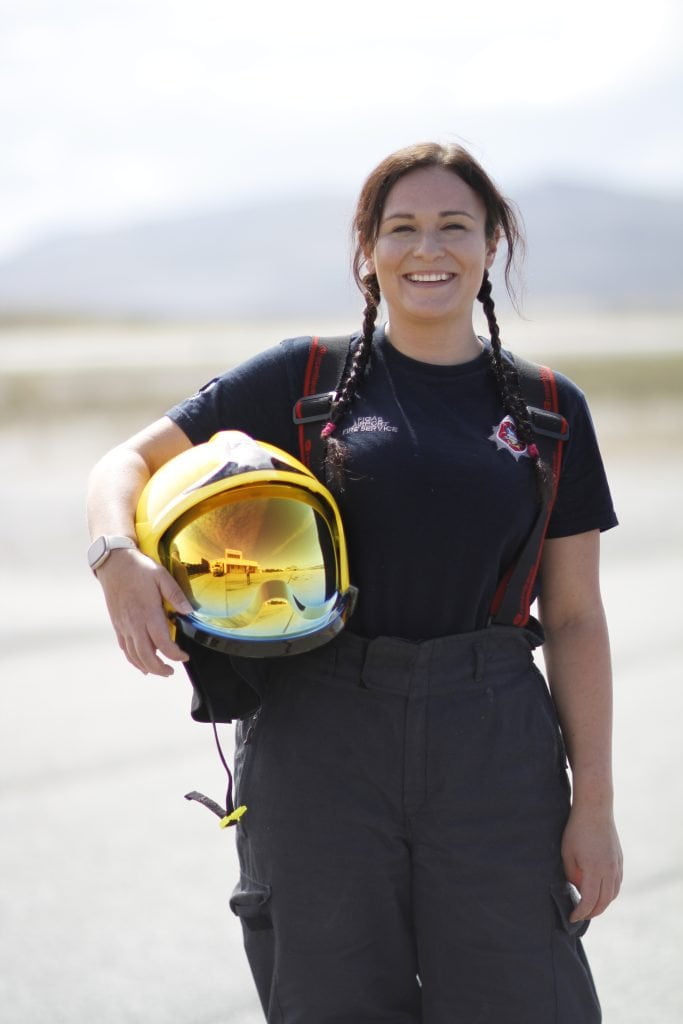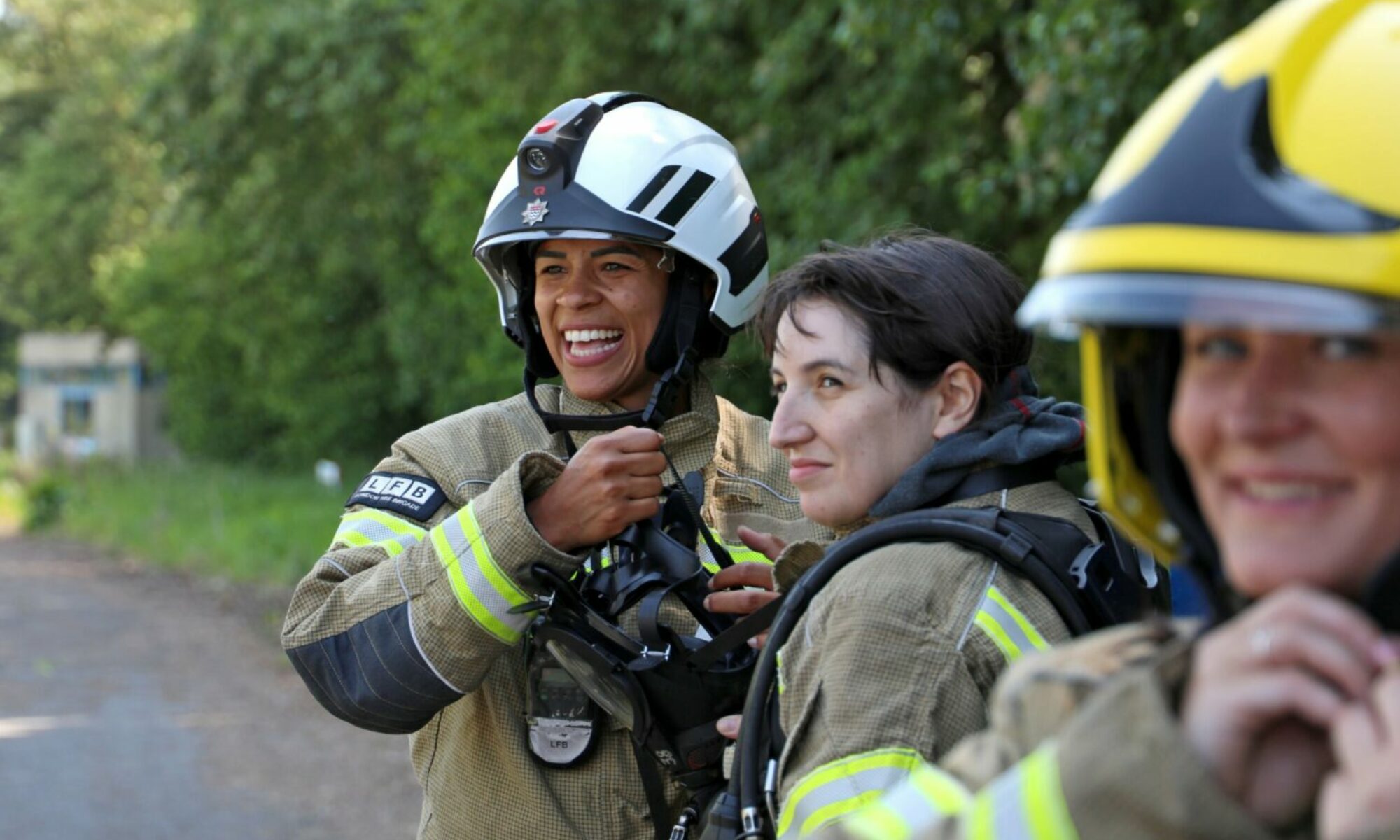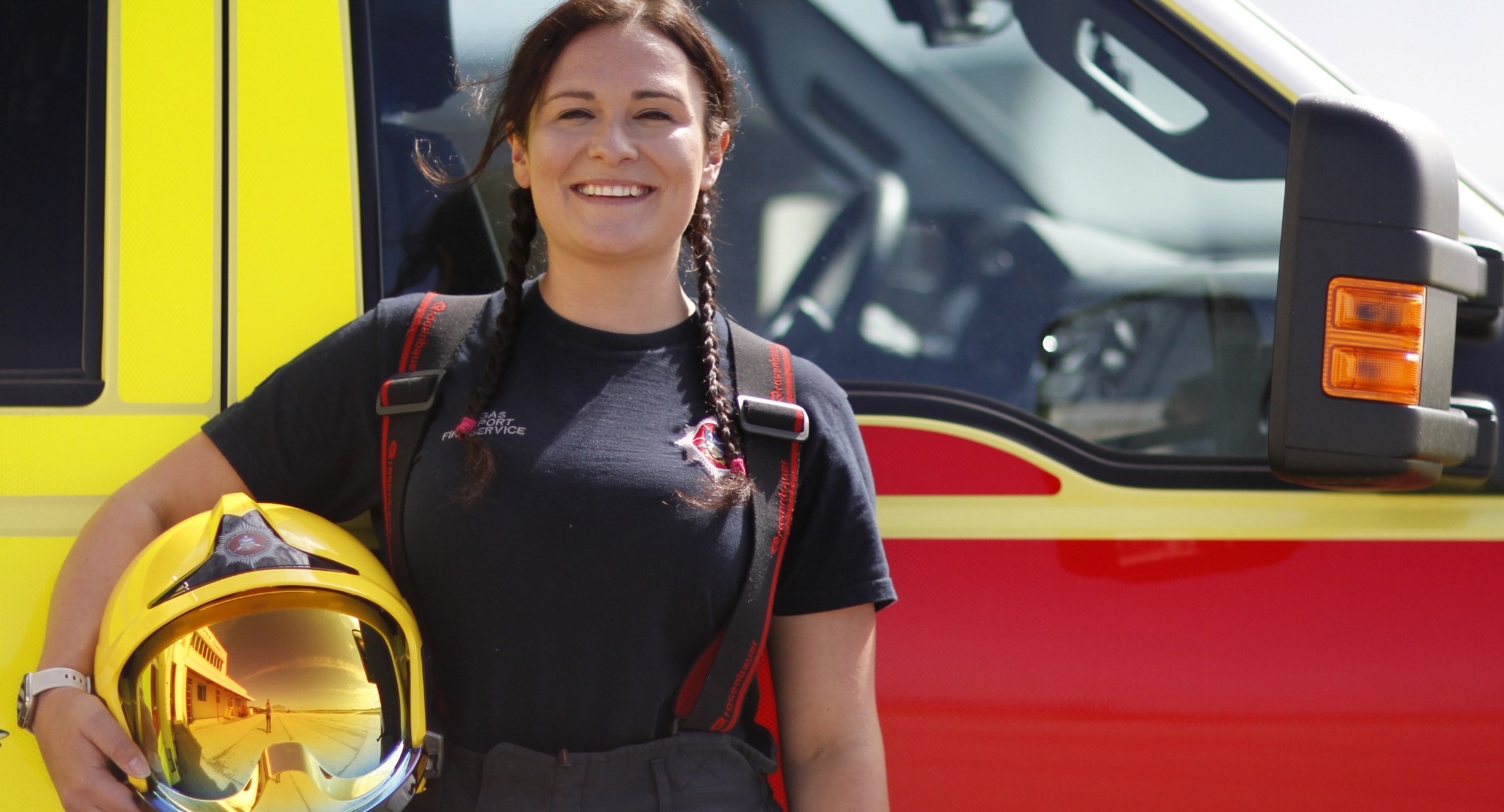Vicky Collier started out her career in the Emergency Services in 2013 as a Retained Firefighter for the Falkland Islands Fire & Rescue Service. Vicky was successful at gaining a full-time role and progressed to Watch Manager, becoming the first qualified full-time female firefighter in the Falkland Islands.
After a PTSD diagnosis, Vicky left this role in 2020. A member of the WFS Facebook Community Group since 2017, Vicky posted that she’d been successful in her application for a position as an Airport Firefighter at the Falkland Islands Government in November 2022.
Vicky has a passion for working with young people and for training. We wanted to find out more about her training for the role, what inspired her to apply, and how her volunteering has helped encourage and inspire girls and young women to be their best.
“If girls do not see women in these positions, they may overlook the role as a possible career choice. Not because they think they can’t pursue a career in the Fire Service, but because it hasn’t occurred to them that it is something they can achieve.”
Vicky Collier

You are four months into the role and heading to the UK for training in spring. What are you looking forward to and what inspired you to apply for the role?
After leaving my previous role, I sought treatment for my Post Traumatic Stress Disorder. After 17 months of Eye Movement Desensitisation and Reprocessing Therapy, I found that PTSD was no longer affecting me on a daily basis. It was around this time that I recall seeing a post in the WFS UK Facebook Group from a member, which led me to consider ways that I could re-start the career that I love so much. When the role of Airport Firefighter was advertised, I visited the airport to discuss the role with the Airport Fire Manager and it was clear that this was a perfect fit for me. The Falkland Island Government Air Service (FIGAS) is a wonderful environment to work in. The Airport Fire & Rescue Service team are fantastic, knowledgeable and extremely supportive.
I am looking forward to heading to the International Fire Training Centre in April to expand my skills and knowledge in a different area of the industry.
What are some of the fire sector qualifications you have? And what do you need to be an Airport Firefighter?
I have been extremely fortunate to have a number of excellent opportunities during the course of my career with the Falkland Islands Government. I have gained my Compartment Fire Behavior Instructor qualification, improved my skills as an instructor with an Education & Training course, expanded my knowledge of Incident Command in the Fire Services during both the Level 1 (initial) and Level 2 (intermediate) courses, and improved my first aid with Level 3 First Response Emergency Care.
FIGAS have a very good reputation for recruiting, training and retaining local staff. Although experience and qualifications are a bonus, they are not essential. A clean driving license, good level of physical fitness, being a good team player, having a positive outlook and a willingness to learn new skills are all important.
The education and development of young people is really important to you. Can you tell us about your volunteer experience as a Guide Leader?
The education and development of young people has always been something that I am passionate about. I have been volunteering with the Girlguides for most of my adult life, across all sections from Rainbows to Rangers. It is so important that young people have opportunities to develop themselves outside of their education, explore other passions and try new things. It is a privilege to be a part of that.
You have had previous experience of working with young people. What do you see as the barriers to young girls pursuing a career in the fire service?
I do ask myself this question fairly often, and reflecting on my own experience I think the two biggest barriers are lack of representation and a lack of opportunities to develop skills. If girls do not see women in these positions, they may overlook the role as a possible career choice. Not because they think they can’t pursue a career in the Fire Service, but because it hasn’t occurred to them that it is something they can achieve.
Something I struggled with is my lack of practical skills and knowledge, and I do think this is a barrier for girls and women when looking at the Fire Service as a career. Manual skills such as basic mechanics, how to use tools, using pumps and engines, these skills are often taught to boys during childhood or at the start of their working life, especially in rural locations. However, these skills are not often taught to girls and we can find ourselves having to gain these skills on the job. I personally found a wealth of support (and patience!) in my colleagues, and I am sure that will be reflected in many services. However, I can see how that can be intimidating to girls and women looking at starting their career.
You are a member an Individual Member of WFS and the Facebook Community Group. What would you say to others who are thinking of joining?
I would say go for it! It is great to have such a supportive community available to support, advise, discuss and mentor you through any issues or positive experiences that you want to discuss.
“It is important to me that I am able to help others by sharing my experiences, and try to remove some of stigma that comes with suffering with our mental health. It is so important that we are able to identify signs that someone is struggling, whether it is ourselves or a colleague, and that we can confidently have these conversations with one another. “
Mental health is very important to you. You donated one of your paintings to the ‘Mental Health to Me’ art auction, a fundraiser for local mental health charity Team Tranquil. Would you like to tell us more?
After my experiences with Post Traumatic Stress Disorder, raising awareness and pushing for positive change in our perceptions of mental health issues has been extremely important to me. In the Fire Service, as with all First Responders, we are at a higher risk of developing PTSD and having other mental health problems such as depression and anxiety. However, it is still seen as something that is still taboo when it should be seen as an operational risk and injury, and should be something we are able to discuss openly.
I have been very open about my PTSD journey, including my treatment and recovery, mostly through writing on social media. It is important to me that I am able to help others by sharing my experiences, and try to remove some of stigma that comes with suffering with our mental health. It is so important that we are able to identify signs that someone is struggling, whether it is ourselves or a colleague, and that we can confidently have these conversations with one another. We used to believe that PTSD was an incurable condition, and I genuinely believed that after my diagnosis. However, we now know that there are many treatment options available, you can live a full and happy life.
There have been some really interesting studies around playing Tetris and the prevention of PTSD developing, in some studies they found that those who played Tetris within hours of a traumatic experience had a 90% reduction in traumatic intrusive memories 5 weeks after the incident, compared to that who did not. We can always be more proactive in trying to prevent this injury from occurring.
What led you to join the Fire Service as a retained Firefighter? Was it what you dreamed of doing when you were at school?
I had never considered the Fire Service as a career when I was at school. It was only as an adult that I saw the advertisement for Retained Firefighters. I mentioned to my friend, Sam that I would like to give it a go, and he helped me get my application together. Once I started, I knew that I had found the career for me.
Thanks to Vicky for giving us an insight into her experiences!
Join the WFS Facebook Community Group or become a WFS Individual Member.

